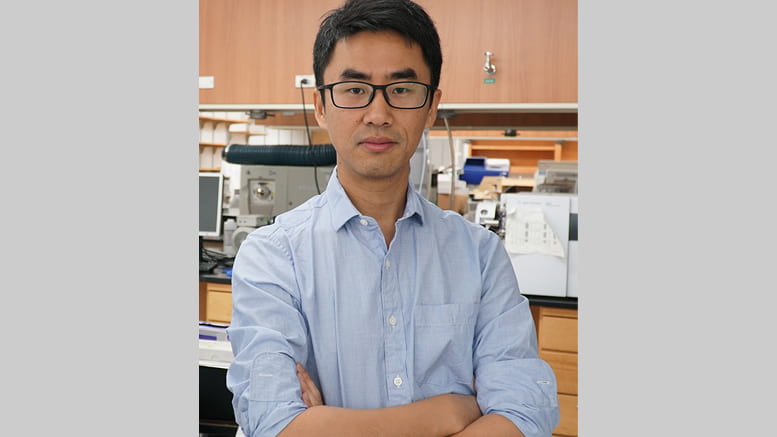Meet Assistant Professor Xiaoyu Zhang to the Department of Chemistry
November 9, 2021

Weinberg College welcomes Assistant Professor Xiaoyu Zhang to the Department of Chemistry! He describes his current research and what he finds most fulfilling about teaching.
Where are you from? Where did you study?
I grew up in Shenyang, China. I obtained bachelor’s and master’s degrees at Zhejiang University (major in pharmaceutical science). Then I came to the US and did my PhD at Cornell University (major in Chemical Biology). I received postdoctoral training in Chemical Biology and Proteomics at The Scripps Research Institute before joining Northwestern.
Please describe your research.
Conventional small molecule drugs act by directly occupying and inhibiting the functions of disease-driven proteins. Many proteins, however, lack functional pockets for rational drug design and are considered challenging to target with small molecules, or even ‘undruggable’. Expanding druggable space not only requires technological innovations that facilitate novel ligand discovery, but also needs new small molecule therapeutic modalities that could alter protein functions through novel mechanisms. My laboratory employs advanced mass spectrometry-based chemical proteomic technologies to discover new small molecule therapeutic modalities, including protein degraders, protein stabilizers and cancer neoantigen inducers/modifiers, that modulate disease pathways or targets in different ways from conventional occupancy-driven small molecule therapies. The long-term goal of my laboratory is to push the boundary of druggable space that eventually enables new small molecule therapeutics.
What are you working on right now that excites you the most?
I am currently working on developing new proteomic approaches that would enable novel chemical tool and ligand discovery. These new approaches have the potential to expand druggable space and provide solutions for diseases that are previously challenging to be targeted with small molecules.
What accomplishments would you like to share?
By leveraging chemical biology approaches, I have discovered two E3 ligases that can be pharmacologically controlled to promote targeted protein degradation. By harnessing these two E3 ligases, I have successfully degraded oncogenic proteins such as BRD4 and Androgen Receptor. These exciting discoveries have been patented. I am currently working on pushing these early-stage discoveries to the translational stage that may eventually advance human health.
What is most fulfilling to you about teaching?
The true value of a successful scientific researcher is not only in their academic achievements, but also in their ability and dedication as an educator to mentor and cultivate new generations of professionals. I enjoy teaching because it not only gives me the opportunity to deliver my knowledge to the young generation, but also allows me to build understanding and respect with my students.
Science & Technology

Northwestern accelerates quantum research with NVIDIA technology
September 19, 2025
NVIDIA code could help researchers tackle computationally demanding tasks hindering quantum research Northwestern University physicists are using NVIDIA technology to tackle the computationally demanding tasks hindering quantum research. Northwestern theoretical physicist Jens Koch and his research group…

CRISPR’s efficiency triples with DNA-wrapped nanoparticles
September 18, 2025
New system delivers CRISPR machinery more safely and effectively into cells With the power to rewrite the genetic code underlying countless diseases, CRISPR holds immense promise to revolutionize medicine. But until scientists can deliver its…

Passion for the planet: A new generation of environmental stewards starts here
May 29, 2025
Over the last two decades, the Weinberg College-housed Program in Environmental Policy and Culture (EPC) at Northwestern has embraced the humanities and social sciences and cultivated a new generation of environmental stewards. Growing up in…

Northwestern receives $25 million gift to advance adolescent mental health research
May 16, 2025
New institute will study psychology of emerging adults, leading to innovative wellness programming for students at the University and beyond Northwestern University is launching the Institute for Adolescent Mental Health and Well-Being, an interdisciplinary initiative…



